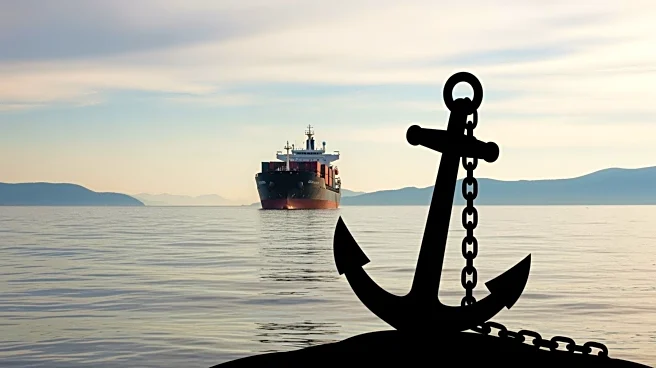What's Happening?
A livestock carrier named Spiridon II has been stranded off the Turkish coast for over two weeks due to document irregularities concerning the ear tags of the cattle aboard. The vessel, which departed from Uruguay with 2,901 cattle, was denied permission
to offload the animals by the Turkish Ministry of Agriculture and Forestry. The denial was based on discrepancies in approximately 500 ear tags. Residents near Bandirma Port have complained of foul odors and insects, prompting port officials to move the ship offshore. Animal rights groups, including the Animal Welfare Foundation, are urging Turkish authorities to allow the unloading of the surviving animals to prevent further suffering. The vessel's owner has requested permission to dock temporarily to resupply the ship with hay, feed, and water.
Why It's Important?
The situation highlights ongoing concerns about the welfare of animals transported by sea, a practice criticized by animal rights activists as inhumane. The incident underscores the challenges faced by the global livestock export industry, which has seen bans in countries like Australia and New Zealand. The stranded vessel exemplifies the risks associated with transporting live animals, including potential health hazards and ethical issues. The delay in offloading the cattle raises questions about regulatory practices and the balance between bureaucratic procedures and animal welfare. The outcome of this situation could influence future policies on live animal exports and impact the operations of smaller shipping companies involved in this trade.
What's Next?
The vessel's owner is seeking permission to dock on November 8 to resupply the ship, but it remains uncertain whether Turkish authorities will grant this request. Animal rights organizations continue to pressure the government to prioritize animal welfare over bureaucratic concerns. The resolution of this situation may prompt discussions on improving documentation processes and regulatory oversight in the livestock export industry. Additionally, the incident could lead to increased advocacy for banning live animal exports globally, as activists highlight the ethical and logistical challenges involved.
Beyond the Headlines
The stranded livestock carrier situation raises broader ethical questions about the treatment of animals in international trade. It highlights the need for more stringent regulations and oversight to ensure humane conditions during transport. The incident may also spark discussions on the environmental impact of livestock shipping, including emissions and waste management. As the global community becomes more aware of animal welfare issues, there may be increased pressure on governments and industries to adopt more sustainable and ethical practices.
















